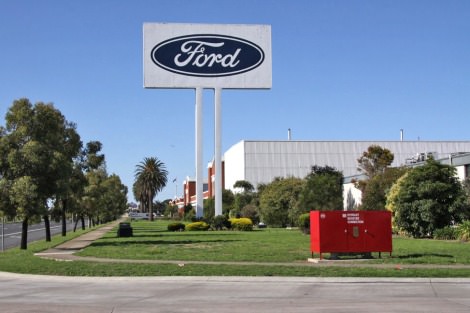Ford have been building cars in Geelong for 91 years. But now their factory is quiet and their former employees are coming to terms with a new reality.
 Growing up in Geelong, many friends worked at Ford, or Alcoa, Pilkington or any of the other allied suppliers. As each of these stopped manufacturing in Victoria's second city, employers and governments promised retraining. But where are the jobs? Factories are quickly moving to a 'lights out' operation, with no lights, no air conditioning — and no humans.
Growing up in Geelong, many friends worked at Ford, or Alcoa, Pilkington or any of the other allied suppliers. As each of these stopped manufacturing in Victoria's second city, employers and governments promised retraining. But where are the jobs? Factories are quickly moving to a 'lights out' operation, with no lights, no air conditioning — and no humans.
Modelling suggests nearly 5000 Geelong residents will lose their jobs to the decline in manufacturing before the end of 2017, and 200,000 nationwide. Can we find new-economy jobs for every one of them?
Futurists are divided. Around 52 per cent of respondents to a Pew Research survey point out that since the dawn of the industrial revolution we've seen that for every job replaced by machines, new jobs have been created. They see no problem with 200,000 job losses as they believe that jobs we've never thought of will open up.
But the remainder see that technology is now at a point where we're not just retraining one group of people — as weavers are replaced by the automatic loom — but where the majority of jobs will be replaced by robots. And this will happen far faster than we are prepared for.
Ray Kurzweil, futurist at Google, says in The Law of Accelerating Returns that the rate of change in technology means 'the next 20,000 years of human progress will be compressed into the next hundred'. Extrapolating, this means we will see the changes we have seen in the 250 years since the start of the industrial revolution compressed into the next 20.
With that number of displaced jobs in such a short time, we cannot replace them with jobs we cannot today imagine.
The only jobs truly safe from the coming robot revolution are pink collar jobs: the service sector, where the output of the work is humanity — rather than cars, food or computer code. While a hairdresser can be replaced by a robot, a machine cannot reassure you that the new style suits you. Coffee pods can win taste tests against baristas, but that's not the point of going to your favourite hipster cafe each morning. However there is a limit to the number of hairdressers and baristas we can find work for.
"Innovation isn't about replacing taxis with ride-sharing apps on your phone. It's not about eking out one more mega-watt from a wind turbine. Those are merely evolutionary progress. What are we planning for a society in which there is no paid work for most people?"
So maybe we need to rethink work.
Work, as we see it today, is the means by which we distribute our common wealth. 'We've wealth for toil' is not only the accepted practice, it's in the national anthem. Our current affairs programs teach us that not working is 'dole bludging' and to be without paid employment probably means you're a 'welfare cheat'. Wealth for toil, however, is a surprisingly new concept.
Before the European invasion, Indigenous Australians had no need for resumes and references. In the Middle Ages in Europe there were no unemployment figures because you either worked on the land you were born on, or for the same land-owner your parents did. We changed the way we live, survive and thrive in the past, and now it's time to do it again.
Industry itself is not going to be the answer to a post-work society. Industry exists to make money for its owners. And replacing expensive humans with cheap replaceable robots is a simple decision. If employers were going to stave off the oncoming revolution in the short term, they'd be making poor economic decisions and will, in the medium to long term, fail as their competitors produce more for less.
This means the answer needs to come from the workers — and by extension, the governments that should represent their interests.
Governments are ultimately left with two possible solutions. Currently we are entering this workless future with the Luddite approach of denial and destruction. Any attempt to think beyond 'work' is ridiculed as we desperately attempt to create work — just to maintain the status quo.
But instead, if Malcolm Turnbull wants Australia to be an innovation nation, he needs to be encouraging programs and experiments that are 'post work'. To be truly innovative means to think beyond what we currently accept. Innovation isn't about replacing taxis with ride-sharing apps on your phone. It's not about eking out one more mega-watt from a wind turbine. Those are merely evolutionary progress. What are we planning for a society in which there is no paid work for most people?
One innovative solution is known as the Universal Basic Income. This idea provides a basic income to every person, regardless of employment status. In his book Where do we go from here? Martin Luther King Jr saw guaranteed income as a way to end poverty. 'The solution to poverty is to abolish it directly by a now widely discussed measure: the guaranteed income.'
US economist and libertarian, Milton Freidman advocated for a minimum guaranteed income via a 'negative income tax'. Even Napoleon said we are all 'entitled by birthright to a share of the Earth's produce sufficient to fill the needs of [our] existence'.
If we fail to act, if we wait for the worst before we react, we will be responding to near-universal poverty and collapsed economies. But acting requires a courage not seen in governments for at least the past few decades. It requires thinking beyond the next election cycle.
I, for one, welcome our new robot overlords. But I suspect our governments will not.
 Rick Measham is an executive in the Tech industry, watching the way we work today and looking to the future. He tweets about technology and work at @divZero_. All views are his own and not necessarily those of his employer.
Rick Measham is an executive in the Tech industry, watching the way we work today and looking to the future. He tweets about technology and work at @divZero_. All views are his own and not necessarily those of his employer.
This is the latest article in Eureka Street's ongoing series on work.